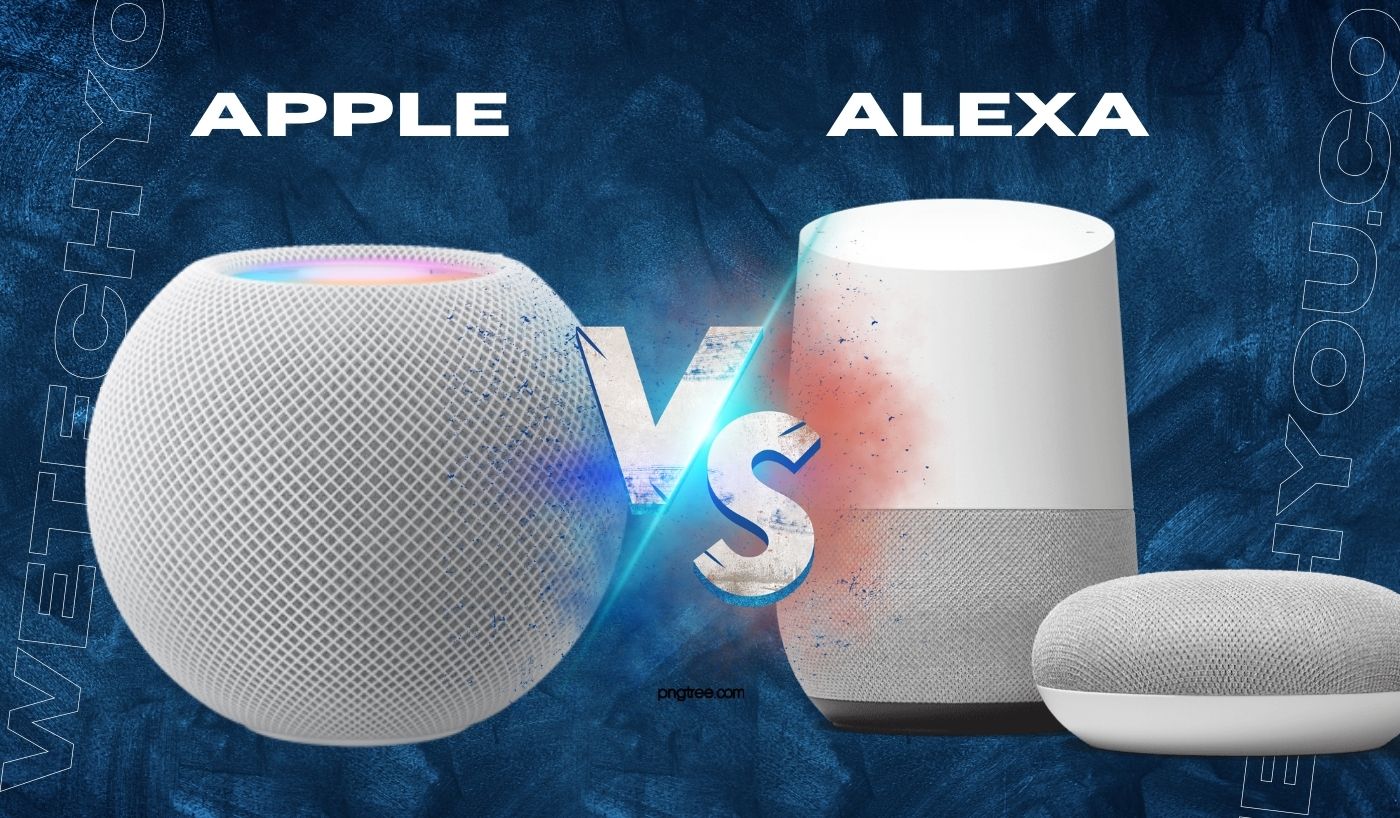Smart home systems are fast changing the way we live in our homes. You may use it to breathe new life into your standard home setup and transform it into something more efficient, Smart, and fascinating.
Smart homes employ linked gadgets and appliances to conduct actions, activities, and automatic routines to save money, time, and energy. Home automation systems enable the integration of numerous smart gadgets and appliances managed by a centralized system.
According to Statista Facts, the global market for smart home technology is expected to reach $140 billion by 2026.
Inspired? When you’re ready to install a smart home system, one of the most important decisions you’ll have to make is which smart home ecosystem to choose. Alexa from Amazon and HomeKit from Apple are two of the most well-known brands in the smart home industry. Which of these methods, however, is best for you?
We’re taking a deeper look at the two major smart home systems to see whether one is right for you.
An Overview of Amazon Alexa
The most popular and commonly utilized Smart home technology is Amazon Alexa. It has deservedly maintained its position for numerous years. The vast number of speakers available is one of its major unique selling features as a smart home solution.
Smart speakers serve as smart home hubs. They act as the brains of your Smart home automation system. Smart speakers serve as the foundation of your smart device ecosystem, allowing Smart devices from many manufacturers to connect and interact with one another.
You’ll be hard pushed to find a Smart speaker with as many features as Amazon’s Echo devices. The Echo Show product range, which includes an interactive display, makes using Alexa for everyday tasks a joy.
Pros of Amazon Alexa
- An open ecosystem supported by hundreds of brands.
- A wide range of compatible devices
- Budget smart speakers maintain the barrier to entry as low as possible.
Cons of Amazon Alexa
- There are just a few languages and dialects supported.
- Accents may be difficult to deal with.
An Overview of Apple Home
Apple’s HomeKit smart home ecosystem is safe and privacy-conscious. It is the least popular of the three primary Smart home ecosystems, but it does not diminish its use.
Apple’s HomeKit takes a different approach than the Alexa and Google Home ecosystems. It is less interested in countertop dominance and broad coverage and more concerned with security and dependability. As a result, the HomeKit ecosystem is relatively constrained, resembling Apple’s previous closed-door approach to innovation.
The Apple HomeKit framework is primarily reliant on third-party devices to function. This reliance is one of the disadvantages of Apple’s HomeKit environment. Apple HomeKit does not produce many speakers and first-party Smart home devices to promote its ecosystem.
The first Apple HomePod speaker will be phased out in 2021. The only HomePod models available are the HomePod Mini and the second-generation HomePod. Apple does not have a Smart display product line comparable to Amazon’s Echo Show or Google’s Nest Hub. This display is a significant constraint.
Pros of Apple Home
- Strong security and privacy safeguards
- Language support is extensive.
- An Apple TV may function as a hub.
- The integration with an Apple Watch simplifies providing instructions and getting vital warnings.
Cons of Apple Home
- A lesser number of devices are compatible.
- A closed ecology with sluggish innovation.
- It is expensive to install and requires iOS devices.
- There are few possibilities for speakers.
Apple HomeKit Vs. Alexa
| Factors | Alexa | HomeKit |
| Voice Control | Yes | Yes |
| Device Compatibility with Third Party | Limitless | Limited |
| Smart Home Features | One-to-Many Connections | One-to-One Connection |
| Privacy and Security | 99% | 100% |
| Personalization | Limitless | Limited |
1. Compatibility
Devices with which an ecosystem is compatible should be one of the prerequisites for adoption. In this regard, Apple’s HomeKit lags Amazon’s Alexa. The problem is that HomeKit isn’t as popular as Alexa. Naturally, this affects product makers’ desire for goods for the HomeKit environment, especially given that cross-compatibility remains a big issue in the Smart home sector.
HomeKit-compatible gadgets continue to expand, it lags Alexa. It is only compatible with a few hundred companies.
Smart device categories, like security cameras, may have dozens or even hundreds of distinct brands and models that are Alexa-compatible. You’ll be able to acquire compatible devices in significant product categories with HomeKit, but restricted selections.
Although Apple’s numbers improve countertop dominance, Amazon’s Alexa wins for widespread usage and countertop dominance.
2. Adoption Cost
Not all Smart home ecosystems are the same. Some cost more to start up and maintain than others. Before investing in a smart home ecosystem, figure out how much it will cost.
The Alexa ecosystem provides better comfort setup costs, while the HomePod mini is just $99. You can buy up to two Amazon Echo Dots for that price. When you buy four or more speakers, you’ll notice a pricing difference between the Alexa and HomeKit ecosystems.
Of course, more than Smart speakers are required to get your smart home up and running. You’ll also need some Smart home appliances. HomeKit-compatible products are often on the expensive side. One reason for this is the stringent standards for HomeKit compatibility. Custom programming for this security chip is expensive.
However, you may need to budget twice as much for HomeKit for other brands. There are, of course, more expensive Alexa-compatible appliances. However, you’ll find a diverse selection of brands and pricing points, letting you select something adequate while remaining within your budget.
The frosting on the cake is that Amazon frequently promotes Alexa-compatible items. When it comes to price, HomeKit has a long way to go. We award this statistic to Alexa once more.
3. Privacy & Security
People who want to use Smart home ecosystems are concerned about security and privacy. Your Smart home ecosystem may go wrong when it contains exploitable gaps. Your home security system is disastrous when in a Smart home environment.
There are no significant differences in security and privacy between the two ecosystems, but Apple’s HomeKit is the environment to use if you have security and privacy concerns. Apple’s data security policies are stringent.
Apple has a reputation for running a tight ship, and the HomeKit security and privacy feature is no exception. Apple focuses heavily on data security and on-device data processing with HomeKit. This focus eliminates data transmission need when affected by nefarious actors.
Apple is also a proponent of end-to-end encryption, ensuring customer data’s smooth transit. Apple HomeKit is the best alternative in terms of security and data privacy.
4. Convenience
Setting up and administering Smart home systems should be as simple as feasible. Although both Amazon and Apple strive for ease of use in the architecture of their ecosystems, setup, and administration are sometimes inconvenient. However, Amazon’s Alexa ecosystem appears to be the superior alternative in this respect.
Despite being interoperable with hundreds of thousands of devices, connecting your smart device to the Alexa ecosystem is not complex. Amazon offers the Frustration-Free Setup (FFS) extension to simplify your use of the Alexa ecosystem in two ways: easy setup and simple reconnect. A simple configuration will assist with part of the labor required to set up your smart device for the first time, while a simple reconnect will assist you in the remaining network connection. FFS, on the other hand, does not function with all Alexa-enabled home appliances.
The Apple HomeKit environment, on the other hand, is not overly complicated to manage, albeit its usability is a matter of opinion. One of the issues with HomeKit is that compatible items might be arduous to integrate into your home network.
There is a degree of trust when you purchase an Amazon-made smart gadget for your Alexa environment. It’s like buying components for a known dinner.
Conclusion
Alexa outperforms the other two competitors in several criteria. Alexa dominates the countertop and is compatible with other Smart home devices.
Apple HomeKit is the industry leader in terms of security and privacy. They are also strong in terms of hardware quality, with the two HomePod versions being excellent examples. Alexa-enabled devices are less expensive. Apple has never been known to release low-cost items.
In the future, the playing field is expected to be more even. Although Apple is presently taking a back seat in HomeKit ecosystem innovation, the corporation has extensive experience in hardware manufacturing and artificial intelligence that it may draw on if necessary. This leaves Amazon, who, while having a head start, is being pursued aggressively.




